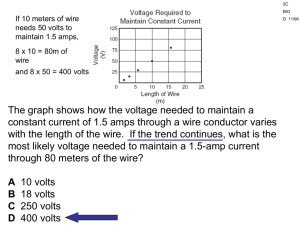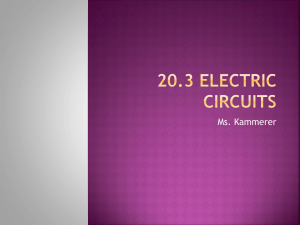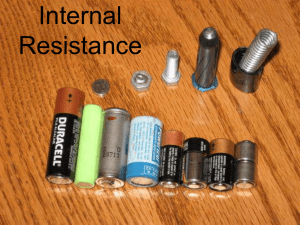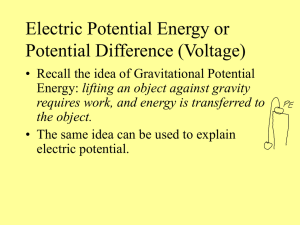Basic Electricity, Part 1-Volts, Amps, Watts, Series, Parallel
advertisement
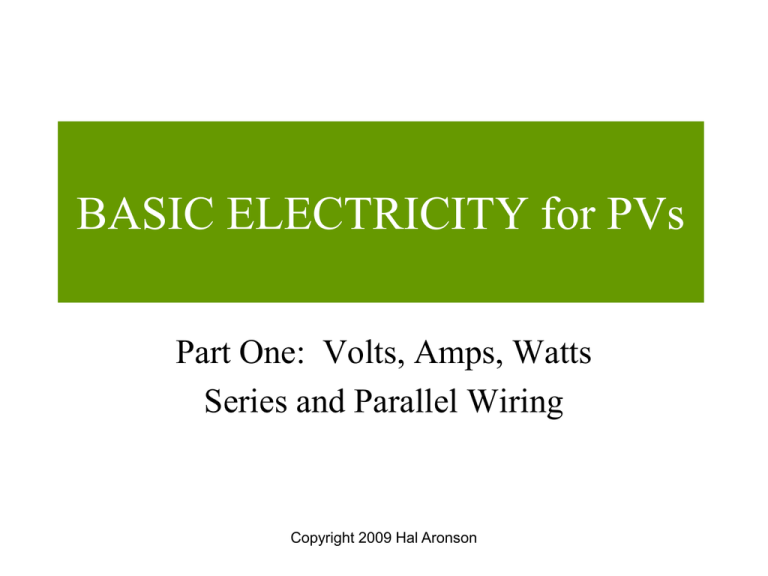
BASIC ELECTRICITY for PVs Part One: Volts, Amps, Watts Series and Parallel Wiring Copyright 2009 Hal Aronson Volts, Amps, Watts Courtesy Clay Atcheson VOLTS • Difference causes “force” • Electromotive Force • Water Analogy: “Pressure” Copyright 2009 Hal Aronson High Volts or Low Volts? Courtesy Clay Atcheson Copyright 2009 Hal Aronson Volts, Amps, Watts Courtesy Clay Atcheson Copyright 2009 Hal Aronson AMPS • Current, Flow of Electrical Charges • Only measurable when circuit is closed (on) • Water Analogy: GPM, volume Copyright 2009 Hal Aronson Can we measure Amps? Can we measure Volts? Copyright 2009 Hal Aronson Can we measure Amps now? How about Volts? How would you measure it? Copyright 2009 Hal Aronson Demonstration Volts and Amps Copyright 2009 Hal Aronson Describe this River in terms of Volts and Amps Copyright 2009 Hal Aronson Compare this same Waterfall in two different seasons in terms of Volts and Amps Copyright 2009 Hal Aronson Watts: Rate of Power Watts: Unit of electrical power, the rate at which energy is being used or generated. In Solar PV, the amount of power a module or an array can generate. Copyright 2009 Hal Aronson Copyright 2009 Hal Aronson Watts is the Product of Volts and Amps Volts x Amps = Watts 12 volts x 5 amps = 60 watts Copyright 2009 Hal Aronson Watts is the Product of Volts and Amps Volts x Amps = Watts Typical light bulb is 60 watts 120 volts x 0.5 amps = 60 watts 12 volts x 5 amps = 60 watts Copyright 2009 Hal Aronson PRACTICE • Write Definitions for Volts, Amps, Watts. Include the Water analogy • Solve the Power Formula Equations on the White board • Share (and check) your answers with neighbor Copyright 2009 Hal Aronson Practice Using Power Formulas • • • • • • 2 volts x 2 amps = ___________watts 4 volts x 2 amps = __________watts 12 volts x 2 amps = _________watts 12 volts x 10 amps = _________watts 24 volts x 20 amps = _________watts 500 volts x 10 amps = ________watts Copyright 2009 Hal Aronson Do Lab #1: Photovoltaic effect Copyright 2009 Hal Aronson The PhotoVoltaic Effect: DeBrief • First: Write in Journals: • Second: Discussion • Energy Transformation: LightElectricty Discuss their explorations: shade, orientation, reflection, concentration Copyright 2009 Hal Aronson Part 2: Series and Parallel Wiring Copyright 2009 Hal Aronson Pressure of One Cylinder of Water Copyright 2009 Hal Aronson Double the height of the cylinder… Copyright 2009 Hal Aronson In similar fashion when we double the battery in series (pos to neg) Copyright 2009 Hal Aronson In series wiring we wire the positive of one of the power sources to the negative terminal of the other power source. E.g. two batteries into a flashlight 1.5 volts + 1.5 volts = 3 volts Copyright 2009 Hal Aronson In series wiring Volts add up and amps stay constant 1.5 volts + 1.5 volts = 3 volts Copyright 2009 Hal Aronson Do Lab #2 Copyright 2009 Hal Aronson The same holds true for wiring Solar Modules in Series 0.5 volts 0.4 amps 0.5 volts 0.4 amps 0.5 volts 0.4 amps Four 0.5 volt modules in series will produce 4 x 0.5 volts = 2 volts The amperage will stay the same Copyright 2009 Hal Aronson 0.5 volts 0.4 amps The same holds true for wiring Solar Modules in Series 3 volts 1 amp 3 volts 1 amp 3 volts 1amp Copyright 2009 Hal Aronson 3 volts 1 amp Parallel Wiring • In parallel wiring, we connect the positive lead of one source to the positive lead of a second power source. In parallel wiring, the voltage stays the same, but the amps add up. Copyright 2009 Hal Aronson Wiring Solar Modules in Parallel and Parallel String One: _ volts, _ amps 3volts 1 amps 3 volts 1 amps 3 volts 1 amps 3 volts 1 amps String Two: _volts, _ amps 3 volts 1 amps 3 volts 1 amps 3 volts 1 amps Copyright 2009 Hal Aronson 3 volts 1 amps
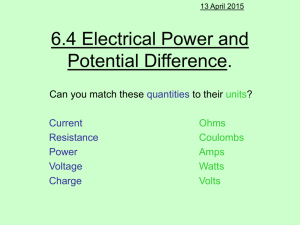

![milgram[1].](http://s2.studylib.net/store/data/005452941_1-ff2d7fd220b66c9ac44050e2aa493bc7-300x300.png)

